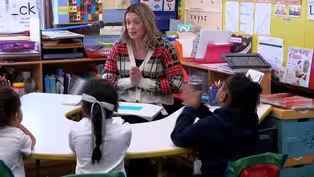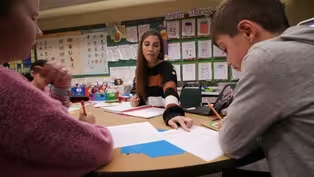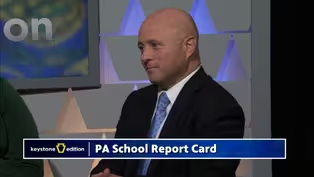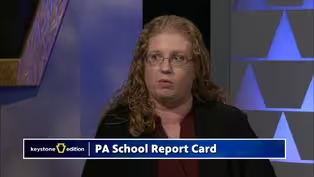Keystone Edition
What Are the PSSAs?
Clip: 1/6/2025 | 4m 21sVideo has Closed Captions
These summative assessments measure knowledge against state standards.
The Pennsylvania System of School Assessment tests students in grades 3–8 on math, English, and, in some grades, science. Mandated by the state, these summative assessments measure knowledge against state standards. Districts use the results to align curricula, address deficiencies, and ensure equitable growth across student subgroups, with accountability and improvement plans tied to performance.
Problems playing video? | Closed Captioning Feedback
Problems playing video? | Closed Captioning Feedback
Keystone Edition is a local public television program presented by WVIA
Keystone Edition
What Are the PSSAs?
Clip: 1/6/2025 | 4m 21sVideo has Closed Captions
The Pennsylvania System of School Assessment tests students in grades 3–8 on math, English, and, in some grades, science. Mandated by the state, these summative assessments measure knowledge against state standards. Districts use the results to align curricula, address deficiencies, and ensure equitable growth across student subgroups, with accountability and improvement plans tied to performance.
Problems playing video? | Closed Captioning Feedback
How to Watch Keystone Edition
Keystone Edition is available to stream on pbs.org and the free PBS App, available on iPhone, Apple TV, Android TV, Android smartphones, Amazon Fire TV, Amazon Fire Tablet, Roku, Samsung Smart TV, and Vizio.
Providing Support for PBS.org
Learn Moreabout PBS online sponsorship(logo whooshing) - Before we go any further, I need to correct myself.
Scranton School District, not Scranton Area School District.
Correct?
All right, sorry about that.
Scranton School District.
I'm gonna start with you, Sarah, because I think when we talk about PSSAs, I think there's a lot of confusion about what that test even is.
Can you explain what a PSSA is, how it's used, et cetera?
- Yeah, so students take the PSSA in third through eighth grades, math and English language arts.
And I think it's what, fifth grade and eighth grade take the science exam as well.
So, you know, schools use that to kind of judge where they are compared to state standards and maybe see areas where they need to improve.
- And this is a state mandate?
- Yes.
All public school students are to take the PSSA test, - Who writes something like this, Sarah?
And who's in charge of creating the test?
- So, there's actually standards that are drilled down into eligible content and assessment anchors that are given to us by the state.
We then, as a district, have autonomy to be able to write the curriculum to match those standards.
But the standards are set at grade levels that give us a benchmark of where students should be performing and what knowledge they should be acquiring at those specific grade levels.
And then in an education world, we'd call these summative assessments because they are to take the information from that year, and it's kind of like an old school final exam, but you take it a little earlier in the year, it's supposed to test you on that knowledge you're supposed to know.
- Summative versus what?
- Well, there's formative assessments, which is teacher questions in a classroom, there's benchmark assessments, which kind of see are you meeting certain targets at certain times.
And then the summative assessment is a big assessment that happens at the end.
And growing up, we took midterms and final exams.
Those are summative assessments.
And then you have other kinds of specific assessments that could take place.
But I think a lot of people compare them to achievement tests like an SAT kind of predictor.
That's not what this is.
This is actually supposed to be testing the knowledge you're supposed to gain in that year.
- Yeah, and I think for some reason over the last several years, PSSAs have become taboo.
And, you know, school districts, you know, they're accused of or blamed at trying to teach to the test.
We are trying to teach to the test.
And the reason we are is because, you know, as Erin said, the state has established these standards.
We all would agree they're very rigorous, appropriate standards.
We think our job and our responsibility is to get every student that we have as close to meeting those standards as they can, whatever their level is, let's get those students as close to meeting those high standards in math and reading and in writing the closest we can.
Because what is that going to do?
It's going to better serve those students in their lifetime.
Whatever they go on to do, having those skills in place is going to be a benefit for them.
And oh, by the way, there's a test that measures how they're doing and holds us accountable.
So really it is something that we view positively.
- So if a student in Honesdale took this test, a student in Pittsburgh is taking the same test, a different test, what are we comparing exactly here?
- I think what Erin was saying before is really important.
So there's eligible content, right?
So every student, no matter what seat you're sitting in, at that grade level across the state, we're trying to hold everybody to the same standard.
What we have the autonomy to do is create and utilize curriculum that we think is going to be best aligned with those standards.
How can we move the needle?
How can we move our kids in that positive direction?
- What about the state?
Is the state looking at these for, is there funding or how else is not money, the numbers being used rather?
- So there's a ranking system where if not only your overall students, but then students within specific cohorts.
So your special education students are cohort, your economically disadvantaged students are a cohort.
Your English learners are a cohort.
All of your different racial subgroups are cohorts.
So it looks at how each of those subgroups is performing.
And it also looks at overall how you're performing.
And then you can be kind of put on an improvement plan.
And there's levels to those improvement plans.
If you're not performing or subgroup's not performing at a level where the state believes that you should be performing.
And they do come with support through the local intermediate units and you have to submit a plan of corrective action of how are you going to address the needs or the deficiencies of the overall group or the specific groups where you're seeing problems.
Depending on your student population,
Improving PSSA Scores and Getting Students Back on Track
Video has Closed Captions
Clip: 1/6/2025 | 2m 49s | WVIA News dives into the lasting effects of COVID-19 on student learning (2m 49s)
PA School Report Card - Preview
Preview: 1/6/2025 | 30s | Watch Monday, January 6th at 7pm on WVIA TV (30s)
PSSA - The Teacher's Perspective
Video has Closed Captions
Clip: 1/6/2025 | 5m 57s | Teachers approach the PSSAs with responsibility but acknowledge the pressure it brings (5m 57s)
Tactics for Improving PSSA Scores
Video has Closed Captions
Clip: 1/6/2025 | 7m 17s | The PSSAs are seen as a valuable tool among many for fostering student success (7m 17s)
Providing Support for PBS.org
Learn Moreabout PBS online sponsorship
- News and Public Affairs

Top journalists deliver compelling original analysis of the hour's headlines.

- News and Public Affairs

FRONTLINE is investigative journalism that questions, explains and changes our world.












Support for PBS provided by:
Keystone Edition is a local public television program presented by WVIA



